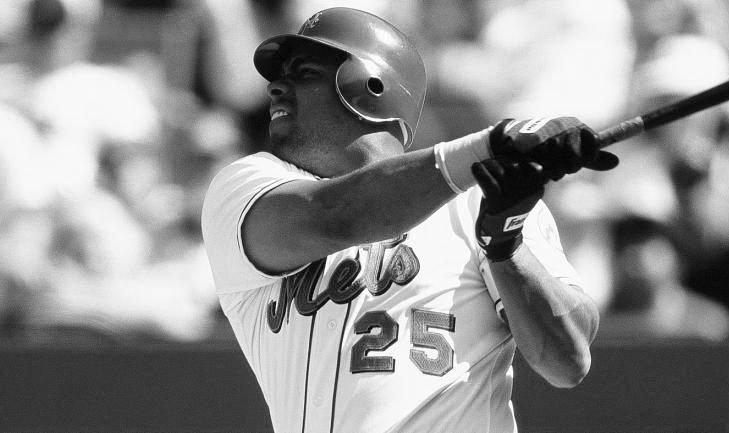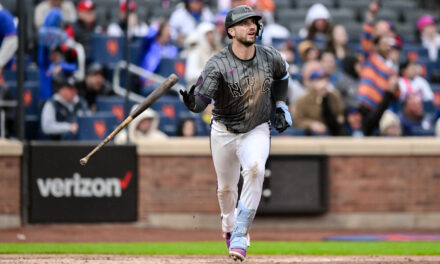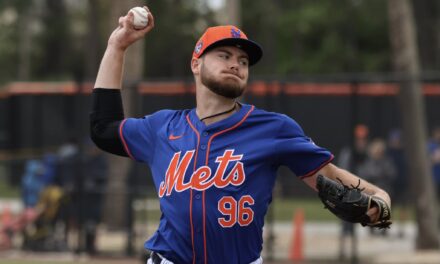
Let’s step into our special Amazin’s time machine and set the dial back to January 3, 2000, the day the New York Mets released Bobby Bonilla and agreed to that so-called infamous annuity to defer his remaining salary.
The Situation
The Twin Towers are standing over downtown Manhattan, and Shea Stadium stands tall in Queens. The Mets have just finished a strong 1999 season, going 97-66 and finishing second to the Atlanta Braves. Led by their young manager Bobby Valentine, the Mets’ hitting stars are Mike Piazza (.303 with 40 home runs and 124 RBIs), Edgardo Alfonzo (.304 with 27 homers and 108 RBI), and John Olerud (.427 OBP, 96 RBI). On the base paths, Roger Cedeno had 66 stolen bases the previous season of 1999 and the ageless Rickey Henderson (.315/.423/.466 and 37 stolen bases) had opposing catchers in fear. The staff ace was Al Leiter (13-12 with a 4.23) and the bullpen had two closers, John Franco with 19 saves and a 2.28 ERA and the recently acquired Armando Benitez (22 saves and a 1.85 ERA).
In 1999, in game 163, the Mets beat the Reds 5-0 in Cincinnati before beating the Diamondbacks in 4. In the League Champion Series, the Mets lost to the Braves 4 games to 2 who went on to get swept by the cross-town Yankees.
What is GM Steve Phillips to do as he looks to gain some starting pitching? The Mets’ 1999 payroll was $71 million, well above the penalty threshold of $59 million, and with arbitration and contract increases is set to increase to $90 million in 2000, the fifth highest in the game, behind only the Yankees, Braves, Dodgers and Red Sox. In December of 1999, the Mets’ are set to pay a 37 year old disgruntled outfielder who had hit only .160 the prior season $5.9 million in the coming year. Bobby Bonilla is that reserve outfielder and he is threatening “fireworks in the new millennium” if he does not play regularly.
The Deferral
Rather than take up a roster spot for a poor defensive outfielder with a bad attitude, the Mets will release Bobby Bonilla. To avoid having almost 7% of the team’s payroll taken up by one player, Mets GM Steve Phillips and Bonilla’s agent, Dennis Gilbert, (who also represented Barry Bonds, Jose Canseco ad Danny Tartabull) turned the $5.9 million owed to Bonilla in 2000 into an annuity that would cost the Mets no cash for 11 years and provide Bonilla with money well into a normal worker’s retirement. The only question was to what interest rate would the money be deferred at?
With the deferred amount annuitized at a mandated 8% interest, the payout schedule which began in 2011 is as follows:
Date Payment PV Factor PV Value
7/1/2011 11 1,193,248.20 2.3316 511,763.70
7/1/2012 12 1,193,248.20 2.5182 473,855.28
7/1/2013 13 1,193,248.20 2.7196 438,754.89
7/1/2014 14 1,193,248.20 2.9372 406,254.52
7/1/2015 15 1,193,248.20 3.1722 376,161.60
7/1/2016 16 1,193,248.20 3.4259 348,297.78
7/1/2017 17 1,193,248.20 3.7000 322,497.94
7/1/2018 18 1,193,248.20 3.9960 298,609.20
7/1/2019 19 1,193,248.20 4.3157 276,490.00
7/1/2020 20 1,193,248.20 4.6610 256,009.26
7/1/2021 21 1,193,248.20 5.0338 237,045.61
7/1/2022 22 1,193,248.20 5.4365 219,486.68
7/1/2023 23 1,193,248.20 5.8715 203,228.41
7/1/2024 24 1,193,248.20 6.3412 188,174.45
7/1/2025 25 1,193,248.20 6.8485 174,235.60
7/1/2026 26 1,193,248.20 7.3964 161,329.26
7/1/2027 27 1,193,248.20 7.9881 149,378.95
7/1/2028 28 1,193,248.20 8.6271 138,313.84
7/1/2029 29 1,193,248.20 9.3173 128,068.37
7/1/2030 30 1,193,248.20 10.0627 118,581.82
7/1/2031 31 1,193,248.20 10.8677 109,797.98
7/1/2032 32 1,193,248.20 11.7371 101,664.80
7/1/2033 33 1,193,248.20 12.6760 94,134.07
7/1/2034 34 1,193,248.20 13.6901 87,161.18
7/1/2035 35 1,193,248.21 14.7853 80,704.80
29,831,205.01 5,900,000.00
As shown above, the money was deferred at 8% interest. As required on page 36 of the 1997-2000 Basic Agreement between the players and MLB:
A uniform annual interest rate, equal to the total of the prime interest rate in effect at The Chase Manhattan Bank on the immediately preceding November 1, plus one percent, rounded to the nearest full percentage point, shall be applied with respect to the following matters:
(1) the calculation of the “discounted present value” referred to in Article VI(A)(4) above, unless the Club and Player mutually agree otherwise;
(2) the calculation of the “present value” referred to in Article IX(F)(1)(b) above;
(3) the calculation of the interest referred to in Article XII(A)(3) above;
(4) the calculation of the “present value” referred to in Article XVI below.
The Mets actually were able to defer the money owed, up to 35 years, at a below mandated, below market rate. And for the first 10 years of that deal they were earning in upwards of 10 percent or more (Thanks Bernie) on the amount annuitized without paying out one dollar.
In the end it looks like Bonilla made out like a bandit cashing in at $29.8 million dollars. But in actuality both sides come out pretty even in present value of money earned and paid out. There were other benefits on both sides.
How else did Bonilla benefit?
Bonilla would have earned and been taxed on his $5.9 million in 2000 on NY State taxes. By not collecting any money until 2011, Bonilla is paying taxes in his home state of Florida, which does not have a state income tax. In addition, by not collecting the money until retirement, Bonilla avoided having a portion of his money taxed by states that have “jock taxes” which are states that tax the money earned on the road in states that do have an income tax (looking at you California) such as the Dodgers, Giants, Padres and inter-league games with the A’s and Angels.
How else did the Mets benefit?
Besides deferring money owed for up to 35 years at a below-market rate, immediately after Bonilla deferred his entire salary, Steve Phillips cleared enough payroll to swing a trade in which the Houston Astros dumped an equivalent salary on them in the form of Cy Young runner-up Mike Hampton in his last year of arbitration and Derek Bell. In exchange the Mets sent Houston Roger Cedeno, Octavio Dotel and minor leaguer Kyle Kessel who never made the Show.
In 2000, Hampton won 15 games for the Mets and led the team with a 3.14 ERA. He won 2 games in the League Championship Series against the St. Louis Cardinals and was named NLCS MVP as the Mets won the pennant for the first time since 1986.
After the 2000 season, Hampton signed with the Colorado Rockies and the Mets received a compensatory pick between the first and second rounds. The Mets’ pick – David Wright.
Conclusion:
Without Mike Hampton, the Mets probably would not have won the 2000 NL pennant, and without David Wright, the Mets history would have far more losses in it than it does. This July 1, let’s remember that the Bobby Bonilla salary deferral was done as required by the Basic Agreement – and all three parties (Bobby Bonilla, the Mets, and us Mets fans) gained from the deferral.














